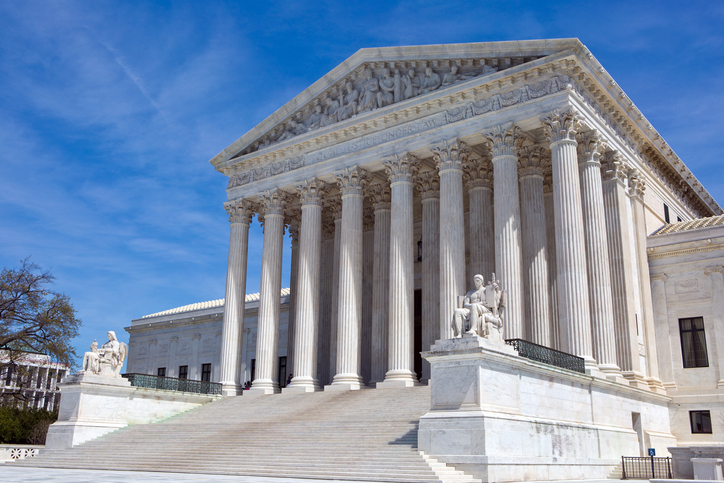The U.S. Supreme Court is set to hear oral arguments in the latest challenge to the Affordable Care Act (ACA), also known as Obamacare, one week after Election Day.
Several Republican state Attorneys General, led by Texas’s Ken Paxton and supported by the Trump Justice Department’s Solicitor General, are challenging the constitutionality of the statute after the GOP-led Congress in 2017 stripped the individual mandate from Obamacare.
In his stunning June 2010 opinion in NFIB v. Sebelius, Chief Justice John. G. Roberts said the ACA’s individual mandate, which imposed a penalty in the form of a fine on those who refused to buy health insurance, constituted a “tax” and was thus compatible with Congress’s power to impose taxes. That made the individual mandate constitutional, Roberts reasoned. Roberts joined the court’s four liberal justices in upholding the ACA on that basis.
Severability Issue
As part of its December 2017 tax reform, the Tax Cuts and Jobs Act, Congress reduced the individual mandate to zero, which provides the foundation for the state AGs’ legal challenge to all of Obamacare.
The AGs are suing under the doctrine of severability. At issue is whether a law stands if part of it, in this case, the individual mandate, is struck down but can be severed from the rest of the statute.
The AGs argue the canceled individual mandate is so intertwined with the rest of the statute that the entire ACA must fall.
The path to the Supreme Court led through the U.S. Fifth Circuit Court of Appeals, which declared the individual mandate unconstitutional but did not rule on whether the rest of the ACA could stand without the mandate. That decision is now before the Supreme Court, which will hear the case in the wake of the death of liberal Justice Ruth Bader Ginsburg.
With eight justices on the court, a 4-4 split could not be ruled out, in which case the matter would be sent back down to Judge Reed O’Connor of the U.S. District Court of the Northern District of Texas, whose 2018 ruling against the ACA was upheld by the Fifth Circuit.
Barrett Nomination
President Donald Trump’s nomination of Seventh Circuit Court Judge Amy Coney Barrett to succeed Ginsburg adds another twist to the drama. If, as now seems likely, Barrett is confirmed before the November 3 election, she will be on the court when the ACA case is heard on November 10.
In an essay published in early 2017 in a journal of Notre Dame Law School, where she was a professor, Barrett wrote that judges should respect the text of laws and that Chief Justice Roberts’ 2010 ruling “pushed the Affordable Care Act beyond its plausible meaning to save the statute.” Barrett reiterated that position at her confirmation hearing before the U.S. Senate Judiciary Committee on October 12.
Barrett gave another glimpse of what her views on Obamacare might be when she signed a petition in 2012 that protested an Obama administration rule requiring employers to include access to birth control for free as part of their health care benefits. The petition argued the provision violated the religious liberties of employers who object to contraception.
The Trump administration rewrote the rule in 2018 to allow employers and universities to exclude birth control coverage on religious or moral grounds. In July 2020, the U.S. Supreme Court upheld the Trump rule.
In the three years Barrett has been on the Seventh Circuit Court, she has not handled a case involving severability, the issue that will be front and center before the Supreme Court in the ACA case. Opinions on severability tend to cut across ideological lines.
Roberts, Kavanaugh on Severability
In two recent opinions involving cases unrelated to Obamacare, Roberts and Justice Brett Kavanaugh expressed a preference for severability. Speaking for the majority in a 6-3 decision on freedom of speech in robocalls, Kavanaugh wrote in July the Court’s preference has been to “salvage rather than destroy” the rest of a law when one section is deemed unconstitutional.
“The court’s precedents reflect a decisive preference for surgical severance rather than wholesale destruction, even in the absence of a severability clause,” Kavanaugh wrote in Barr v. Association of Political Consultants.
Roberts expressed a similar view in a 5-4 decision, Seila Law v. CFPB, handed down in June 2020 in a case challenging the Consumer Finance Protection Bureau’s for-cause removal provision.
“We think it clear that Congress would prefer that we use a scalpel rather than a bulldozer,” Roberts wrote.
The Supreme Court will likely deliver a mixed verdict on the ACA, says Ilya Shapiro, director of the Robert A. Levy Center for Constitutional Studies at the Cato Institute.
“Regardless of whether Judge Barrett becomes Justice Barrett, it’s highly likely that the individual mandate will fall, because John Roberts’s taxing-power saving construction is no longer available,” said Shapiro. “But it’s also equally unlikely that the ACA as a whole will go down with it.”
Bonner R. Cohen, Ph.D., (bcohen@nationalcenter.org) is a senior fellow at the National Center for Public Policy Research.
